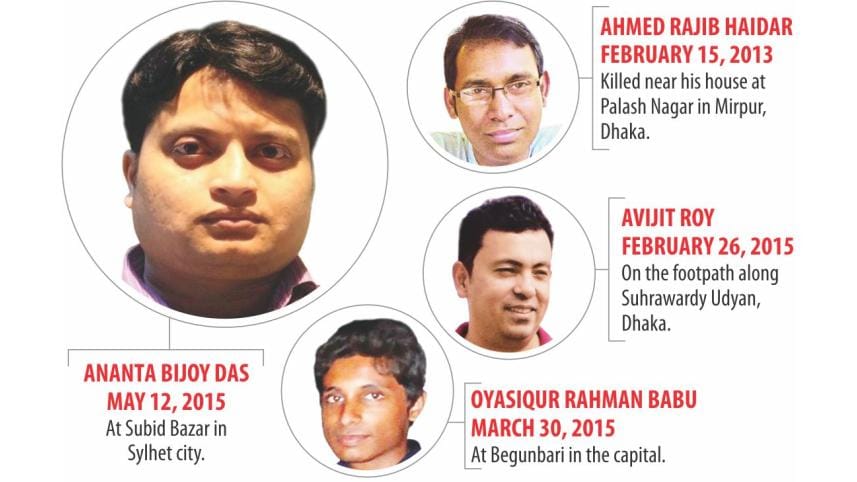Has the country turned into a killing ground for free thinkers?

BARELY a month after the vicious murder of Avijit Roy, another blogger and online activist, 27 year-old Oyasiqur Rahman Babu, was hacked to death in broad daylight on March 30. The killers, caught by two transgender passersby, have confessed to the killing.
Unlike Avijit, who I knew for more than fifteen years and contributed for a long time to his widely-known Mukto-Mona blog, I did not know anything about the ill-fated Oyasiqur Rahman. A staunch critic of religious extremism, Oyasiqur was active mostly on Facebook where he used to write in the Bangla blogosphere. Immediately after his killing, the social media was abuzz with condemnation.
However, Oyasiqur was not to be the last victim of the terrifying brutality. Less than six weeks after his brutal murder, another blogger Ananta Bijoy Das of Mukta-Mona met the same fate. He was known for advocating science and secularism, and was hacked to death by masked men wielding machetes while on his way to work on the morning of May 12 in Sylhet. He died instantly in the attack.
Like in the aftermath of Avijit's and Oyasiqur's killings, the killing of Ananta Bijoy Das also captured media headlines around the globe. The New York Times wrote: "A blogger who wrote for a website that promoted secularism was hacked to death on Tuesday by a group of four men. It was the third fatal attack on a Bangladeshi blogger since February. The assailants walked away after the attack, leaving Mr. Das's body near a pond."
The Washington Post wrote, "Attacks on progressive writers and critics of Islam are happening with increasing regularity in Bangladesh, where nearly 90 percent of citizens are Muslims. The country has a long tradition of official secularism — the principle was enshrined in the 1971 constitution (though that section was nullified between 1979 and 2010). But in periods of conflict, it also has a tradition of antagonism toward religion's most radical critics."
Starting with the murder of Prof. Humayan Azad, we have lost Ahmed Rajib Haider, almost lost Asif Mohiuddin, lost Avijit Roy, Oyasiqur Rahman and now Ananta Bijoy Das. Frustrated with the lack of progress in the Avijit murder case, the 32-year-old Ananta had posted a status on Facebook on March 15: "If the killers are not tried, it is understood that they will hone another machete for another strike!" Ironically, he himself became the victim of that machete.
However, as far as public knowledge goes, none of the perpetrators of these despicable crimes have been brought to book yet. Over the last six years the country has had a government that claims to nourish the values and virtues of our liberation war; the foremost among them was the freedom of thought and belief. It is widely felt by us, and more so by outsiders, that ours is a corrupt and criminality-plagued society. However, the number of convictions for such crimes hardly reflects the validity of the perception. If one analyses why criminality and corruption are so pervasive in the society, the first and foremost answer would be the impunity enjoyed by the perpetrators. After every dreadful crime, people hear about some arrests, remand, confessions etc, but hardly the people hear about the perpetrators being convicted.
It seems our legal system is more lenient in giving them bail rather than dispensing justice. The liberal bailing of the suspected criminals has been encouraging the suspected perpetrators to carry out more dreadful crimes. Many militant leaders and activists who had been arrested on specific charges managed to walk out of jail only to assume more crucial roles in militant activities. The government of the day has created a positive impression to the outside world as the one who is bent on continuing its crusade against religious extremism and terrorism. However, it has not made much
progress in bringing the perpetrators to justice in the dreadful murders that happened over the last few years.
It seems that the investigation of Avijit and Oyasiqur's murder cases have stalled and have made no headway over the last two months or so. Obviously, the current murder was the result of past impunities. Such killings might not have happened if the previous attacks were investigated properly and the people behind those given harsh punishment. The government is really on the cross-road in bringing a quick dispensation of the cases of these dreadful killings. If the government fails to bring the culprits swiftly to justice, as it did in the past, the big question would be, who is next?
Citizens who still believe in the notion of secularism but have taken an ostrich-like stance, stating that 'they are not me, anyway', will face the eventuality as beautifully sequenced by the German resistance fighter Friedrich Gustav in Nazi Germany:
When the Nazis came for the communists,
I remained silent;
I was not a communist.
When they locked up the social democrats,
I remained silent;
I was not a social democrat.
When they came for the trade unionists,
I did not speak out;
I was not a trade unionist.
When they came for the Jews,
I remained silent;
I wasn't a Jew.
When they came for me,
there was no one left to speak out.
The writer is the Convenor of the Canadian Committee for Human Rights and Democracy in Bangladesh.




 For all latest news, follow The Daily Star's Google News channel.
For all latest news, follow The Daily Star's Google News channel.
Comments